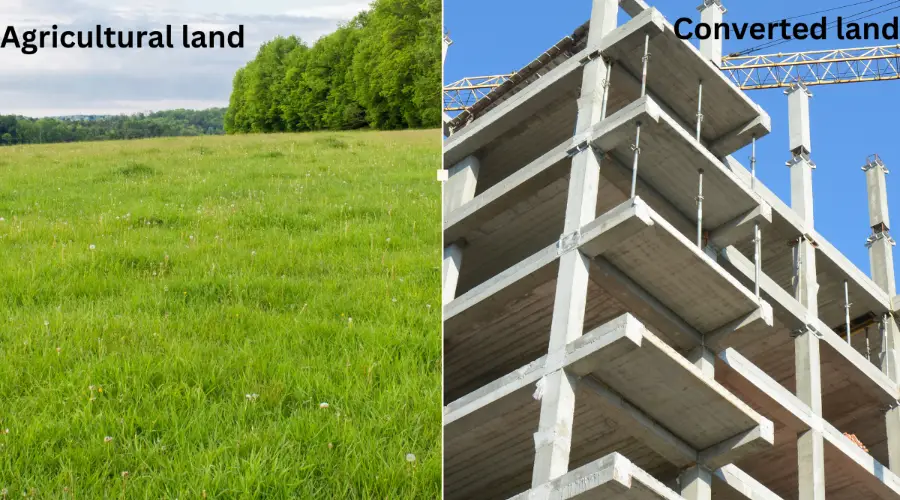The population boom in our country has resulted in a situation of having 488 people per square kilometer. In earlier days, people from rural areas traveled to urban regions to avail themselves of abundant opportunities. However, in recent times, this trend has reversed. People from urban areas want to relocate to rural locations to find solace and escape city congestion. They can’t relocate to a ready-made apartment in rural locations. They need to buy a plot to build their dream house. While acquiring a plot, an individual must ensure the land is clear of legal issues. The foremost verification should be to assess that the land is not agricultural and that it is all clear to construct a building. As per Indian law, no individual is allowed to build a commercial building on agricultural land if it has not undergone the land conversion process. This article will explain clearly the land conversion and various aspects of it to make the construction process hassle-free.
What is Land Conversion

Abiding by the Indian legal procedure, before kicking off any constructional work on agricultural land, it is mandatory to acquire a land conversion certificate. The process behind the conversion of agricultural land for other purposes is called land conversion. Without this land conversion being carried out, no individual can use the land for developmental purposes such as building residential, commercial, industrial, and medical facilities. He/she may be punished if they proceed without acquiring a conversion certificate.
Purpose of the Land Conversion Certificate
The certificate is a legal document that enables the transition of land from original use to another specified purpose. Obtaining a land conversion certificate ensures that the developmental projects on land whose original purpose is different become legally permissible. The land conversion certificate also affects tax rates. In India, the tax rate for agricultural land is less compared to the tax on commercial land. Possessing the certificate ensures appropriate tax charges are collected. Overall, the certificate reduces the potential risk of an individual being charged or fined in the future. The absence of a land conversion certificate can even lead to fines or demolition of structures built on the land.
Documents Needed for Land Conversion
While the governing authorities and their rules may vary based on the state, documents needed for land conversion remain the same. This document submission varies among states, with some states demanding additional documents. To a certain extent, these lists of documents may differ among states. Some of the most commonly required documents for land conversion in all states are,
- An identity proof of the landowner.
- A duplicate copy of the sale deed and partition deed. The partition deed is only required incases where the land is inherited.
- Record of Rights, Tenancy, and Crops (RTC) is required.
- Mutation status of the land and a encumbrance certificate.
- Survey maps.
- An extract containing the ownership of the land.
- A Non-Objection Certificate from the local municipal council or the gram panchayat.
- The payment receipt for land revenue.
Process for Applying for Land Conversion Certificate

Realising its importance, the government has simplified the process of obtaining land conversion certificates that are available both offline and online. Below, a clear step-by-step procedure for obtaining this key piece of documentation via online and offline has been listed.
Land Conversion Process Offline
The process of obtaining a land conversion certificate involves visiting the local revenue department or the village panchayat office. One could get a form of documentation that needs to be submitted to the office.
- Request for conversion authorisation from the deputy commissioner or the collector by applying to them. Along with your applications, a few papers such as the land record certificate, copies of the land map, the measurement plan, and the letter of mutation must be submitted.
- Surveyors will carry out the verification of the application. The relevant information will be verified by the authority referring to the tehsildar’s office. An on-site inspection is carried out to ensure the land is vacant.
- During these procedures, the application may be turned down if the land is in dispute. Along with the authority, a sub-divisional officer or collector will appoint a planning and development authority to verify.
If these procedures proceed without any obstruction, the change of land use application will be accepted. As the owner of the land, you must ensure the land is not used for any other purpose aside from the reason mentioned in the change of land use.
Online Land Conversion Certificate in Karnataka
- The first and foremost step is to visit the revenue department’s official website. Next, you should fill out the application and upload it for processing.
- Visit the Karnataka government’s official website for land record systems. i.e., Land Records Bhoomi.
- Provide necessary details such as name, email address, mobile number, Aadhar number, and address to register on the website.
- An OTP will be sent to the registered number, and you should maintain a username and password to log in.
- Affidavit-based conversion options should be chosen.
- Scanned copies of the requisite documents should be uploaded.
- The respective authorities will carry out an inspection based on the submitted documents. The owner is expected to pay a fee after the Deputy Commissioner’s(DC’s) approval. This enables them to download and print the land conversion certificate.
Fees for Land Conversion
The fee at which the land is converted depends on two factors.
1. In which state are we talking about?
2. Based on the intended use of the land
Land converted for residential use costs ₹327 within 12 km of city corporation limits, ₹218 within the taluk limit, and ₹89 within rural areas. For the same localities, the cost varies if the land is intended for commercial purposes. Land within 12 km of city corporation limits costs ₹654, ₹327 within the taluk limit, and ₹218 within rural.
Conclusion
The Land Conversion Certificate for any new construction on agricultural land is something that needs to be obtained. Otherwise, it may lead to serious penalties. The process might differ from one state to another, but the state insists upon the submission of relevant documents, verification, and applicable fees. Further, with insight into the processes of land conversion, and by diligently following the required processes, individuals may successfully convert the lands for desirable purposes without legal hurdles to proceed with their construction projects.

